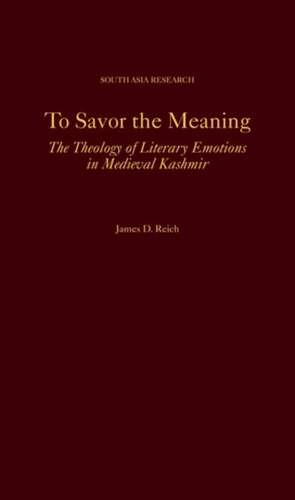To Savor the Meaning: The Theology of Literary Emotions in Medieval Kashmir: South Asia Research
Autor James D. Reichen Limba Engleză Hardback – 7 sep 2021
Din seria South Asia Research
- 27%
 Preț: 3275.75 lei
Preț: 3275.75 lei - 22%
 Preț: 498.25 lei
Preț: 498.25 lei - 28%
 Preț: 444.29 lei
Preț: 444.29 lei - 27%
 Preț: 489.76 lei
Preț: 489.76 lei -
 Preț: 395.00 lei
Preț: 395.00 lei - 30%
 Preț: 877.31 lei
Preț: 877.31 lei - 30%
 Preț: 870.37 lei
Preț: 870.37 lei - 29%
 Preț: 755.59 lei
Preț: 755.59 lei - 33%
 Preț: 938.11 lei
Preț: 938.11 lei - 50%
 Preț: 806.85 lei
Preț: 806.85 lei - 30%
 Preț: 646.43 lei
Preț: 646.43 lei - 30%
 Preț: 678.34 lei
Preț: 678.34 lei - 30%
 Preț: 501.01 lei
Preț: 501.01 lei - 45%
 Preț: 448.13 lei
Preț: 448.13 lei - 48%
 Preț: 414.41 lei
Preț: 414.41 lei - 30%
 Preț: 629.39 lei
Preț: 629.39 lei - 47%
 Preț: 593.97 lei
Preț: 593.97 lei - 30%
 Preț: 987.76 lei
Preț: 987.76 lei - 27%
 Preț: 701.54 lei
Preț: 701.54 lei
Preț: 558.34 lei
Preț vechi: 638.61 lei
-13% Nou
Puncte Express: 838
Preț estimativ în valută:
106.87€ • 110.13$ • 90.22£
106.87€ • 110.13$ • 90.22£
Carte disponibilă
Livrare economică 30 ianuarie-05 februarie
Preluare comenzi: 021 569.72.76
Specificații
ISBN-13: 9780197544839
ISBN-10: 0197544835
Pagini: 280
Dimensiuni: 236 x 160 x 25 mm
Greutate: 0.57 kg
Editura: Oxford University Press
Colecția OUP USA
Seria South Asia Research
Locul publicării:New York, United States
ISBN-10: 0197544835
Pagini: 280
Dimensiuni: 236 x 160 x 25 mm
Greutate: 0.57 kg
Editura: Oxford University Press
Colecția OUP USA
Seria South Asia Research
Locul publicării:New York, United States
Recenzii
To Savor the Meaning offers a fascinating look into the merger of aesthetics and theology in Indian thought. Reich insightfully explores how Abhinavagupta analyzed the response to a poem as akin to God's self-reflection, what might have led to this view, and how it was later criticized, all in the context of the rich, multi-religious debates of Kashmir between the ninth and the twelfth centuries.
To Savor the Meaning ventures into a significant but heretofore insufficiently explored area of intellectual enquiry: the relationship of aesthetics and religion in the Sanskritic learned literatures of Kashmir. The materials addressed in this book are complex, important, and fascinating, for Reich sets in comparison the approaches of two foundational authors of Indian aesthetics (alaṃkāraśāstra), the Śaiva polymath Abhinavagupta and the author of the Vyaktiviveka Mahimabhaṭṭa, both of whom flourished in Kashmir just after the turn of the second millennium. Lucidly written and exhibiting extensive learning, this book makes a significant contribution to the study of Indian religions.
James Reich's study of the debate at the center of medieval Kashmiri philosophical aesthetics is an invaluable addition to the literature. It shows with exceptional clarity the complex argumentation inside two philosophical schools that sought to ground aesthetic philosophy in two different theologies; which reveals the grandeur and range of medieval Kashmiri philosophy. This will be an indispensable guide for those who, without being Sanskritists, wish to understand and make use of the immense diversity and subtlety of Kashmiri theories in philosophical aesthetics.
To Savor the Meaning is a clear, cohesive, engaging, and compelling book. Most of all, it is a book worth reading carefully.
To Savor the Meaning ventures into a significant but heretofore insufficiently explored area of intellectual enquiry: the relationship of aesthetics and religion in the Sanskritic learned literatures of Kashmir. The materials addressed in this book are complex, important, and fascinating, for Reich sets in comparison the approaches of two foundational authors of Indian aesthetics (alaṃkāraśāstra), the Śaiva polymath Abhinavagupta and the author of the Vyaktiviveka Mahimabhaṭṭa, both of whom flourished in Kashmir just after the turn of the second millennium. Lucidly written and exhibiting extensive learning, this book makes a significant contribution to the study of Indian religions.
James Reich's study of the debate at the center of medieval Kashmiri philosophical aesthetics is an invaluable addition to the literature. It shows with exceptional clarity the complex argumentation inside two philosophical schools that sought to ground aesthetic philosophy in two different theologies; which reveals the grandeur and range of medieval Kashmiri philosophy. This will be an indispensable guide for those who, without being Sanskritists, wish to understand and make use of the immense diversity and subtlety of Kashmiri theories in philosophical aesthetics.
To Savor the Meaning is a clear, cohesive, engaging, and compelling book. Most of all, it is a book worth reading carefully.
Notă biografică
James D. Reich is Assistant Professor in the Department of Philosophy and Religious Studies at Pace University. His work focuses on the intellectual history of literature, religion, and philosophy in South Asia. He studied religion at Harvard University (Ph.D., 2016), Harvard Divinity School (M.T.S., 2009), and Vassar College (B.A., 2005).
